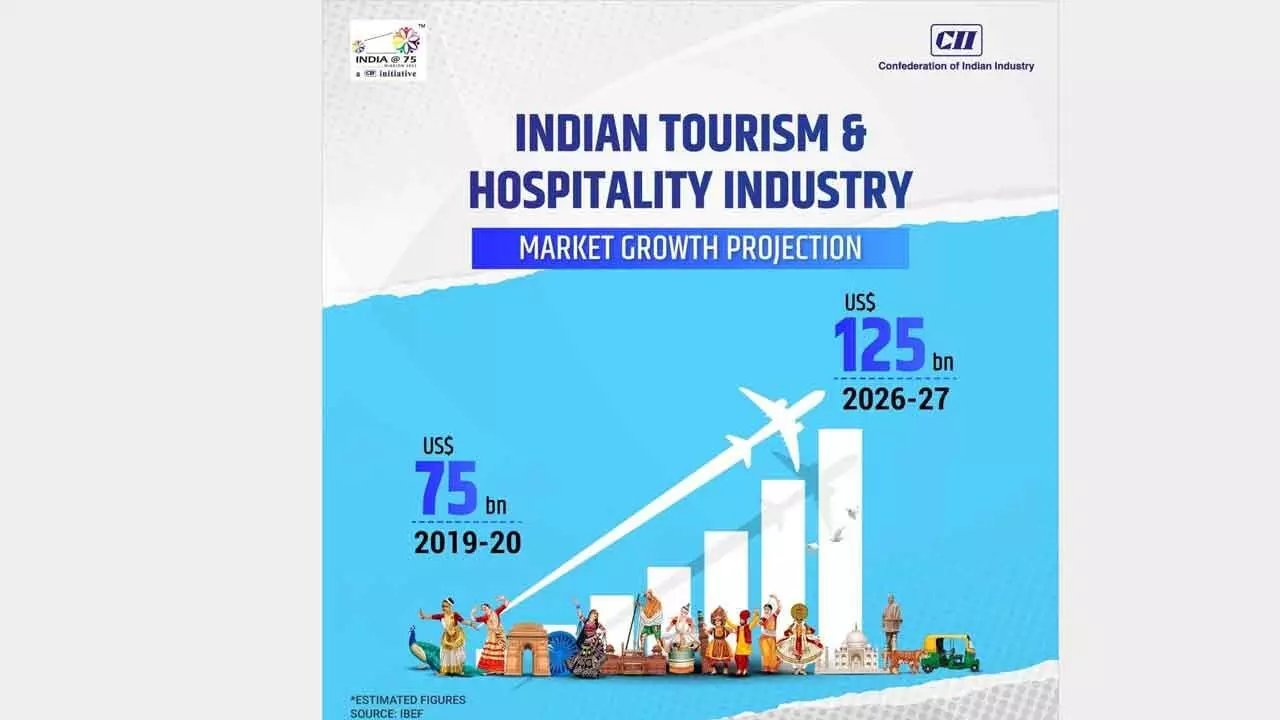Industry Status For Tourism And Hospitality Sectors Can Boost Investments And Create Jobs
The stakeholders seek reduction in GST rates, enhanced financial support for MSMEs and promotion of sustainable tourism practices
Industry Status For Tourism And Hospitality Sectors Can Boost Investments And Create Jobs

Tax measurements should also not be overlooked. Industry leaders are asking for a lesser GST rate when it comes to hospitality services. Doing so will especially help small and medium businesses in the F&B sector
As presentation of the Union Budget 2025 draws near, the tourism and hospitality sectors are optimistically anticipating announcements that could shape their future growth trajectory. As key pillars of the country’s economy, they contribute significantly in terms of employment generation, foreign exchange earnings, and cultural promotion. With an eye on accelerating post-pandemic recovery, the stakeholders are hopeful of strategic incentives, infrastructure investments and policy reforms to bolster domestic and international tourism.
The major players in the sector are calling for reduction in GST rates, enhanced financial support for small and medium enterprises and measures to promote sustainable tourism practices. Additionally, initiatives such as improved connectivity, the development of heritage sites, and marketing campaigns to position India as a global tourist hub are expected to take centre stage.
The upcoming budget presents a critical opportunity to address these demands and unlock the sector’s full potential in driving economic and cultural enrichment.
It is time that our hospitality sector is acknowledged as ‘Industry’ across all states. This is how companies can easily access long-term loans that too with a suitable interest rate. If the approach is implemented effectively, Indian companies can expand and modernise their operations, which will subsequently allow them to compete and parade the indigenous flair on the global firmament.
Moreover, an industry status will bolster collection of property tax, and ensure benefits in land allocations, saving on energy costs and other government benefits. Some states like Assam, Rajasthan, Uttar Pradesh and Gujarat have already granted industry status to the tourism sector, but the hope is for it to be broader.
Now, as the announcement of the budget for the new financial year is round the corner, players in the travel sector have once again renewed their hopes for an industry status to the sector, especially because travel and tourism are two of the largest industries in India. Their total contribution is about $199.6 billion to the country’s gross domestic product (GDP).
FHRAI’s primary recommendation is to grant infrastructure status to hotel and convention centre projects with costs starting from ₹10 crore. The current criteria for infrastructure status requires hotel projects to exceed ₹200 crore and convention centres ₹300 crore, making it inaccessible to smaller projects that dominate the local market. Furthermore, the additional criterion that cities must have a population of over one million to qualify creates a significant barrier for tourism development. More than that, they are asking for more skill development initiatives so that the current workforce shortages can be fixed while upskilling the existing talent pool. This is also important because the tourism sector is growing by leaps and bounds.
Tax measurements should also not be overlooked. Industry leaders are asking for a lesser GST rate when it comes to hospitality services. High taxation is not helping them earn the profits they expect, a factor that can deter prospects of more investment. Doing so will especially help small and medium businesses in the F&B sector.
The direct contribution of the Indian hotel industry to the country’s GDP is estimated to touch $1 trillion by 2047, driven by a significant jump in domestic tourist visits and international arrivals.
Aji Nair, CEO of Mirah Hospitality, says, "As we approach the Union Budget 2025, the F&B sector looks forward to measures that address key challenges such as rising food inflation, operational costs and the intricate tax structures on alcohol and aerated beverages that impact profitability. A progressive framework that fosters innovation, simplifies policies and enables sustainable growth will be pivotal for the industry's success.
The restaurant sector is urging for restoration of the GST Input Tax Credit, which would significantly ease operational expenses and thereby enhance efficiency. Additionally, revisiting GST notification on commercial leases under the Reverse Charge Mechanism can help reduce financial burdens. With these steps, the sector can focus on innovation, customer experiences, and long-term growth.”
FHRAI emphasises the need for reforms in excise and liquor licensing rules, which are currently complex and involve high fees. The association suggests a simplified process, similar to the FSSAI registration system, with nominal fees. This can make it easier for businesses to comply and help meet the growing demand for leisure and entertainment services.
The federation believes that these proposed reforms will play a significant role in realizing India’s vision of becoming a $1 trillion tourism economy by 2047. By addressing these issues, India can enhance its position as a global tourism destination, create more jobs, increase foreign exchange earnings, and contribute to the overall growth of the economy.
For the aviation industry, ICRA expects the budget to continue its focus on the regional connectivity scheme, along with opening new airports and expanding capacities at some key existing airports.

